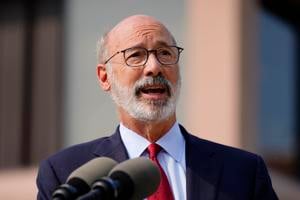Wolf: $1.2B in spending will bolster Medicaid services

(The Center Square) – Pennsylvania Gov. Tom Wolf plans to spend $1.2 billion in federal funding from the American Rescue Plan Act to boost home- and community-based Medicaid services, including those for the elderly, disabled, and children with serious medical needs.
The American Rescue Plan Act gives states a one-year, 10% increase in federal Medicaid funding with the stipulation the money is used to enhance and expand specific home and community based services.
In Pennsylvania, the plan is to spend the money on staff recruiting and retention, supplies to facilitate services, training and learning opportunities, support for families caring for loved ones, improving functional capabilities of people with disabilities and enhancing transitional supports, Wolf announced Monday.
“More than 3 million Pennsylvanians are able to access essential physical and behavioral health care because of Medicaid, but beyond that, Medicaid makes it possible for individuals to live safely and supported in their communities among their family and peers,” Wolf said.
“As Pennsylvania continues to rebuild from a difficult two years, this funding will be an invaluable investment in normalizing and advancing services and supports for Pennsylvanians.”
The Pennsylvania Department of Human Services submitted a proposal for spending to the federal Centers for Medicare & Medicaid Services (CMS) in June, then resubmitted a revised plan in August after feedback from CMS and collecting public comment. The plan is pending full approval from CMS, though the Wolf administration already is preparing to implement the plan, according to the Monday announcement.
“A robust, thriving home and community-based services system is an essential part of our health care system and recognizes the inherent freedom of individuals to live independently,” Department of Human Services acting Secretary Meg Sneed said.
“Our service systems, providers and workforce have continued to deliver care through the pandemic with incredible resiliency and flexibility,” she said. “This enhanced funding is an opportunity for us to invest in them as they invest in their communities and the people they serve. On behalf of DHS and the Wolf administration, we are grateful for their dedication to their work, and we look forward to using this funding to recognize their service and support growth and innovation moving forward.”
Many of the public comments collected for Pennsylvania’s plan highlighted the reimbursement rate for home and community based services, which has increased a total of 4% since 2008. The relatively low pay, coupled with enhanced unemployment benefits during the pandemic, exacerbated existing staffing issues, and many home health care providers urged Pennsylvania officials to spend the federal funding on bolstering pay to better retain and recruit health care workers.
“We want to pay our employees fair wages, but with a reimbursement rate that is less than $20/hour, we simply can’t,” wrote Debbie Barry, with BAYADA Home Health Care. “Dog walkers are paid better than the state of Pennsylvania pays our agency to take care of medically fragile patients. This isn’t right.
“The VA is reimbursing at $24 per hour. Our private pay clients are paying upward of $25+/hour. And the Office of Long Term Living is at $17.72-$19.52. This is a disgrace.”
Edith Walters-Wilson, president of Caring Hearts Health Care Services, agreed that the current rates are unsustainable, and she’s “not sure we can survive” without a significant increase.
“Our industry is one that helps keep medically compromised individuals in their home instead of nursing homes and hospitals, preventing the high cost of hospitalizations and nursing home admissions,” she wrote. “The reimbursement rate of $17.72-$19.52 creates a challenge for organizations like ours in hiring and retaining qualified employees to provide services to many medically compromised people who are in dire need of these services.
“We are competing with hospitals and other medical organizations who are in the position to pay their staff more than double the amounts that we can afford to pay our employees based on the current reimbursement rate the state pays for these very essential and crucial services.”
Disclaimer: This content is distributed by The Center Square
